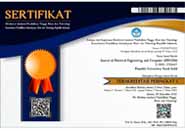Face Recognition-Based Door Lock Security System Using TensorFlow Lite
Authors (s)
(1) Vrazsa Viantyezar Septyanlie (Universitas 17 Agustus 1945 Cirebon)
Indonesia
(2) * Vidya Ikawati
 (Universitas 17 Agustus 1945 Cirebon)
(Universitas 17 Agustus 1945 Cirebon) Indonesia
(3) Erfan Subiyanta (Universitas 17 Agustus 1945 Cirebon)
Indonesia
(4) Nina Lestari (Universitas Sangga Buana)
Indonesia
(*) Corresponding Author
AbstractA door security system utilizing face recognition technology based on TensorFlow Lite has been developed to enhance access security and convenience. This research aims to design a system capable of accurately recognizing faces in real time, integrating it with door lock devices, and ensuring user data security. Employing the waterfall method, the system was implemented using an ESP32-CAM microcontroller and deep learning algorithms. Testing results demonstrated a face recognition accuracy of 91% in identifying and processing commands from 200 trials with ten facial variations. Successful integration with door lock devices was achieved through serial communication. The system also features activity log recording for monitoring purposes. This solution offers greater practicality and security than RFID systems as it eliminates the need for physical cards. This research contributes to developing more sophisticated and user-friendly home security systems, with the potential for further enhancements in recognition capabilities under various lighting conditions and integration with other biometric technologies
|
Keywords
smart home, face recognition, door lock, tensorflow lite, deep learning
Full Text: PDF
Refbacks
- There are currently no refbacks.
Copyright (c) 2024 Vrazsa Viantyezar Septyanlie, Vidya Ikawati, Erfan Subiyanta, Nina Lestari

This work is licensed under a Creative Commons Attribution License (CC BY-SA 4.0)
Journal of Electrical Engineering and Computer (JEECOM)
Published by LP3M Nurul Jadid University, Indonesia, Probolinggo, East Java, Indonesia.








